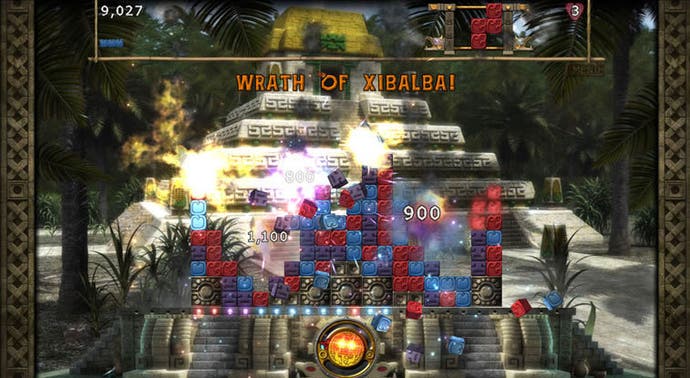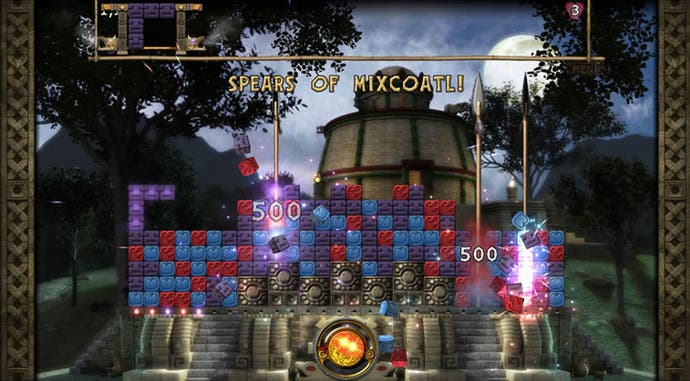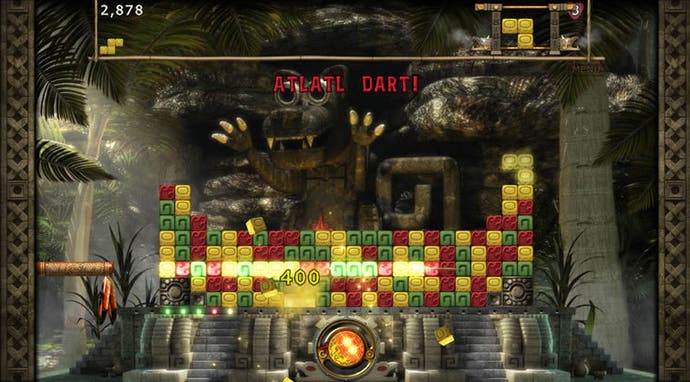TiQal
It's raining Mayan.
I really wish that TiQal had been released twenty years ago. For one thing, it would mean that all subsequent block-dropping, colour-matching puzzle games would have to be described as "TiQalish", but mostly because at least then there would be something interesting or original to say about this utterly generic effort.
TiQal is the debut offering from the unfortunately named Slapdash Games, a company set up by former employees of MumboJumbo, the home of casual smash hit Luxor. Of course, Luxor bore more than a passing similarity to PopCap's Zuma, and it's clear from this effort that we're not going to be dazzled with originality any time soon. TiQal is about as predictable as casual games get, a Frankenstein gameplay carcass stitched together from elements openly swiped from previous titles.
You move a "dropper" across the top of the screen, and deposit shapes onto the ascending wall below. Right away, and rather blatantly, the game invites comparisons to Tetris, even using many of the same block shapes. However, rather than trying to create complete horizontal lines, your aim here is to form square or oblong blocks of the same colour. These then shimmer, and you have a few seconds to add more to the block for a larger score before it shatters. The aim isn't to clear the screen but to fill the score-meter at the bottom, as in...well, as in Luxor. That's variety, I guess.

Large scores cause power-ups to periodically float up for the taking, and these almost always assist in clearing space on the board. One sends spears stabbing up from beneath, clearing several columns. Another sends a dart horizontally, clearing a row. There's also a sort of bomb, which can detonate tricky chunks that are getting in your way. The longer you play, the more powerful the assistance. There are power-ups that will change large areas to the same colour, creating an instant score boost, and a wild card pick-up that allows your current piece to work with any colour. Create an impressive chain, and you release a flurry of hearts. Collect twenty of these for an extra life.
It's all tied together by a seemingly random Mayan theme. Why? Well, ever since Luxor casual puzzlers apparently need an ancient world hook, and Slapdash clearly isn't willing to deviate from a winning formula. There's also a story, which basically means that each level is book-ended by a few lines of text and sometimes you're told that you've collected some item or other. None of this has any impact on the gameplay - levels offer the exact same thing regardless of whether you're impressing a shaman or escaping from a temple - so while it's clear that Puzzle Quest has also had some DNA swiped by TiQal, the actual depth and scope of D3's classic genre-twister is sorely missed.

Despite the name, Slapdash's presentation is anything but. TiQal is a slick, polished-looking affair, with suitable ambient music and satisfying special effects when large blocks shatter. Yet there's almost no challenge to be found here, and in one sitting I managed to clear over half the 120 levels, losing only a few lives in the process. The power-ups are terribly imbalanced, making it far too easy to reduce the blocks on screen and rack up points without even trying, while the core concept of forming square blocks is far simpler than completing lines and clearing the screen. Unless you deliberately play badly, there's little chance of losing a level. There didn't even seem to be any noticeable increase in difficulty between the first and fiftieth levels, and I soon found myself ploughing through the game on auto-pilot while my conscious mind busied itself with more important matters, such as what can be deleted from the Sky+ box and wondering if the chicken in the fridge has defrosted yet.
This lack of engagement, combined with the game's overly familiar patchwork of concepts, means that it passes by in a sort of disconnected fugue. This isn't the focused zone-out that truly great puzzlers like, yes, Tetris or Puzzle Quest create, but an ambivalent sleepwalking state in which you're endlessly matching shapes and colours but without being terribly engaged in the process. It's gaming as ennui; you're doing it simply because you're doing it and as soon as you can muster the energy to get on with something else, you'll stop.

The problem isn't that TiQal is a casual game, but that it's a lazy casual game. A game so mired in existing formula that it has nothing to offer beyond bland distraction. It's almost as if the folk at Slapdash were afraid to attempt anything that players might not recognise from previous games - not the best way to distinguish your new venture from the old.
For some, of course, this will be enough. Maybe you've just given up smoking, for instance, and just need something to do with your craving fingers. It's phenomenally easy to grasp - you can figure out how to play just from the screenshots - and the flatlined learning curve over 120 levels means that few players will get lost along the way. For those who still value their cognitive functions, however, TiQal has little to offer. It makes all the right noises to fit into its niche, but does so in such a flavourless and anonymous manner that there's no compelling reason to spend another 800 Points, especially when so many similar yet superior titles are already available on Live Arcade.

